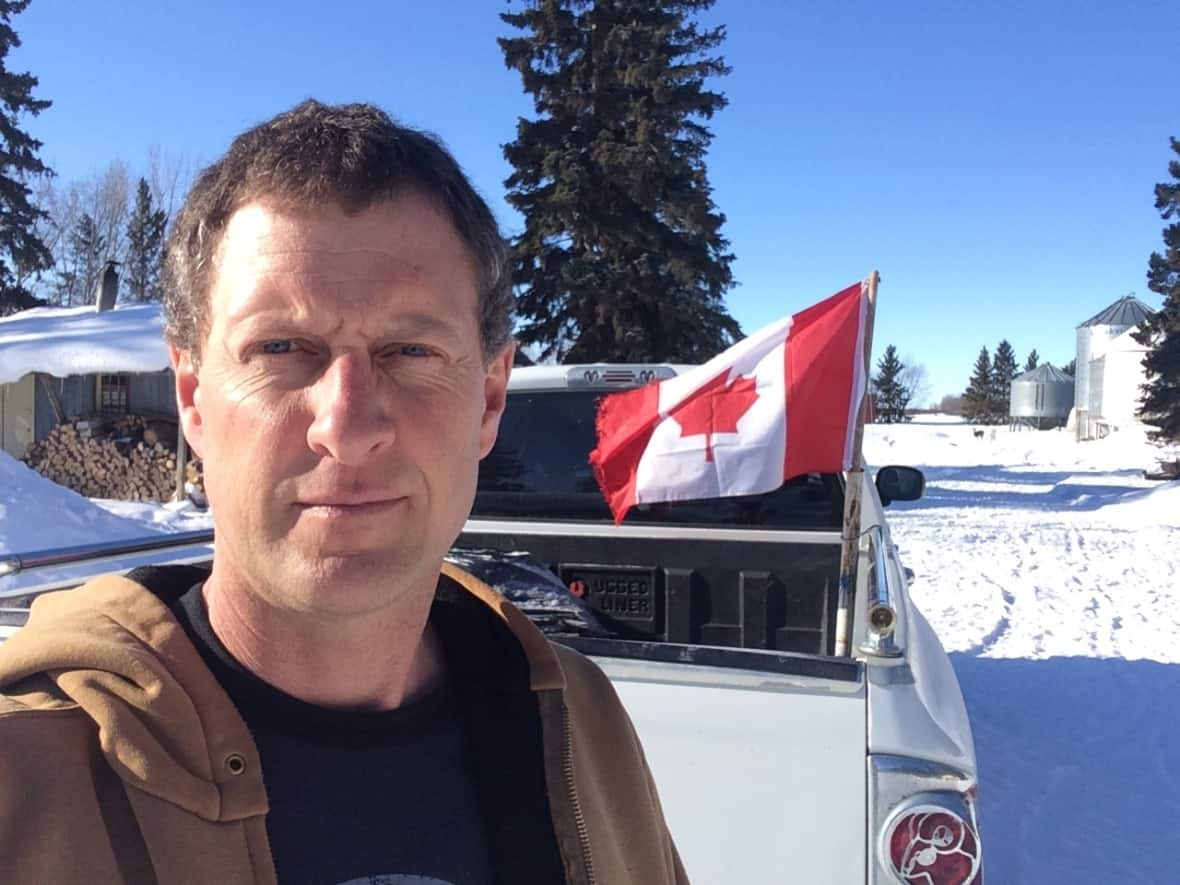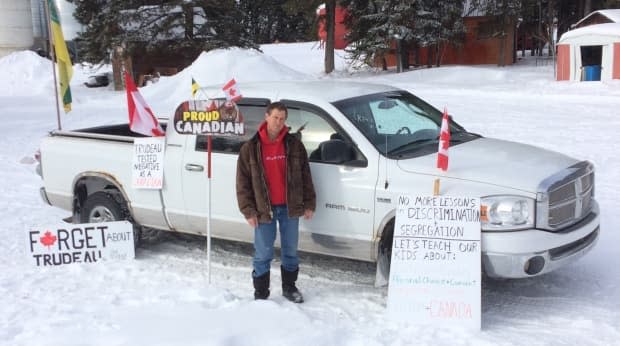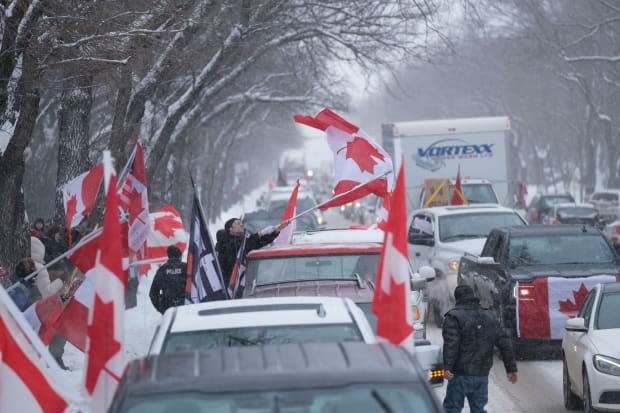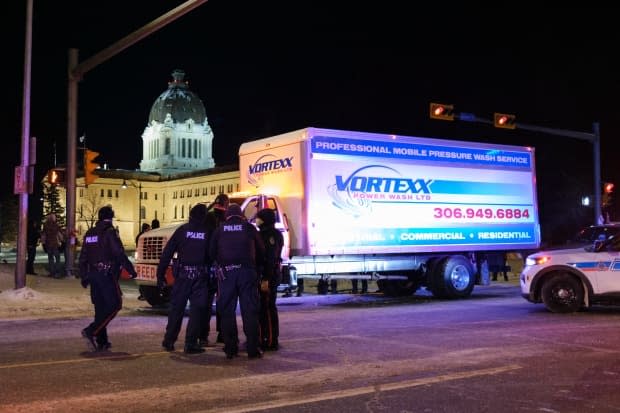This farmer's truck was towed at a COVID-19 anti-mandate protest. He wants you to hear him out.

Nathan Phillips had never been to a protest before.
But in early February, the 47-year-old grain farmer from Tisdale, Sask., decided he'd had enough with COVID-19 vaccine mandates from governments that he no longer trusted to do the right thing.
The divorced father-of-two packed granola bars and a sleeping bag into his white Dodge Ram on Feb. 5 and drove 300 kilometres to join a "Freedom Convoy" protest in Regina.
Organizers had vowed to surround the Saskatchewan Legislature with trucks and "occupy" the area until all public health orders were removed.
Phillips never imagined that his truck would be towed 36 hours later.
While he'd set off to find a "sense of belonging" and to exercise his democratic right, he left the protest feeling like a criminal, alone with no phone or truck.

Call him naive, he said, but he figured his right to protest trumped municipal bylaws.
"I was parked on a street. I'll own that no problem. But in considering the size of disruption from some of the other protests in Canada, I didn't think that the parking violation I was committing was worthy of the treatment I received from the police," he said.
The Regina Police Service (RPS) said parking on a roadway is an illegal act.
"When the actions of the protesters became unlawful, we took the appropriate steps to maintain peace," said RPS spokesperson Elizabeth Popowich in an email to CBC News.
Phillips said all protesters are being painted as extremists and criminals in Canada right now — and a small group of them likely are, he concedes — but that people have lost sight of the "ordinary, hardworking" people who simply feel compelled to speak out against government restrictions.
He's sharing his story because he believes more communication and understanding are needed.
Watch this Saskatchewan farmer describe how his truck was towed at a protest:
Losing trust
Phillips's path to the anti-mandate protest began nearly four years ago on April 6, 2018.
As a volunteer firefighter with Tisdale Fire Department, he was one of the first at the scene of the Humboldt Broncos bus crash. Sixteen people died and 13 others were injured after the junior hockey team's bus collided with a transport truck that failed to stop at an intersection.
Documents from the Workers Compensation Board (WCB) show a psychologist diagnosed Phillips with an adjustment disorder — an unhealthy or excessive response to a stressful event or change. The WCB denied his psychological injury claim because it related to the fire department's staffing decisions after the crash, not the crash itself.
"I think I really quit trusting other people to make decisions on my behalf," he said.
When the pandemic began in early 2020, the farmer complied with most restrictions, he said, even though he believed isolation caused more mental harm.
He didn't get vaccinated or vaccinate his two kids, ages 12 and 15, despite advice from health experts.
He felt the provincial and federal governments crossed a line when they introduced proof-of-vaccination mandates.
Joining the protest
Phillips said that when he and his son weren't allowed to eat inside a ski chalet in January, he felt they were treated like they were "dirty."
"I watched the hurt in my 12-year-old son as we respectfully followed the rules while an upper class of 'clean' vaccinated people only 10 feet away from us were allowed to have a meal," he said. "After that, I realized that I need to be one of those people that go down to the Legislature and wave a sign and be a body there, just saying 'this is the time for change.'"
Premier Scott Moe had already promised to lift all public health orders in the province.

Still, Phillips wanted to attend the Regina protest to support the Ottawa protest and show that calls to end federal vaccine mandates weren't just coming from "a fringe minority."
Phillips, who also doesn't trust the media, doubted the accuracy of news reports that protesters in the nation's capital had danced on the National War Memorial, harassed a homeless shelter, and displayed the Confederate flag and swastikas.
"I spoke to a friend out in Ottawa who is at the protest.… [He said] the bad stuff you hear on TV, that doesn't even exist. It's just exaggerated," he said. Starting in late January, thousands of protesters have occupied Ottawa's downtown core, frustrating residents and politicians, and resisting all efforts from law enforcement to get them to leave.
When the Provincial Capital Commission put up concrete barriers to cut off vehicle access to the Saskatchewan Legislature, Phillips joined other protesters in driving up and down Albert Street. He felt it was a "time and place of connection and belonging" with "smiles and hugs."
They eventually parked, blocking a lane of traffic.
Phillips said no police officers spoke directly with him or warned him that he would be towed.
Enforcing laws
Police say protesters had plenty of warning.
On Saturday night, there were 24 vehicles parked in the northbound driving lane of Albert Street near the Legislature. Officers issued them all parking tickets for stopping in a driving lane.
"This enforcement action did not result in any co-operation and vehicles remained parked into the next day," said Popowich.
On Sunday, Feb. 6, police issued six more parking bylaw tickets and two tickets under the Traffic Safety Act. An unoccupied vehicle — Phillips's truck — was secured for towing.

Popowich said officers attempted "communication, negotiation, warnings, ticket (on both days), and finally, towing, which would have happened to any of the drivers who chose to remain at that point."
"We believe there were many opportunities for them to know they were in violation of the law and could be subject to enforcement action by police," she said.
The protest fizzled out pretty quickly after tow trucks showed up.
Phillips said he begged officers to let him drive his truck away, but his pleas were denied.
"I just felt like a failure. There's the farm truck, the family vehicle, getting dragged away, and that was my fault, my doing," he said.
While he initially felt ashamed, he now considers the police actions to be "heavy-handed."
The farmer eventually paid $414.75 to get his truck out of the police impound lot. He still has to pay a $70 parking ticket.
He believes police officers were put in a difficult position as well, and that their unwillingness to show him leniency is emblematic of how divided society has become.
"I just want us all to be friends after this [pandemic] is said and done. It's just, somewhere in the middle, that needs to be the consideration – not just fix the damage after. Let's try and prevent it from happening," he said.


